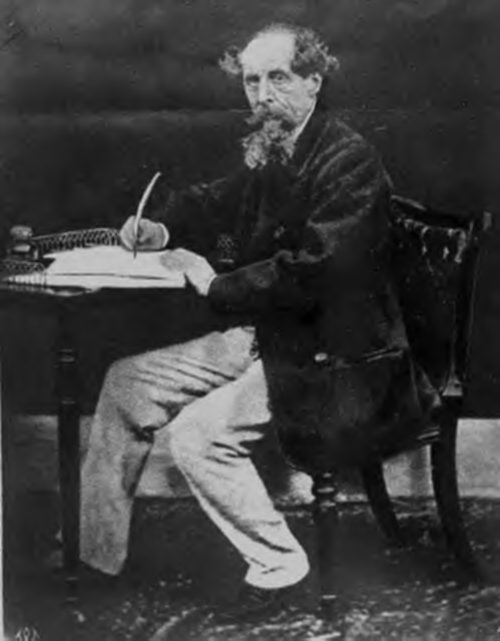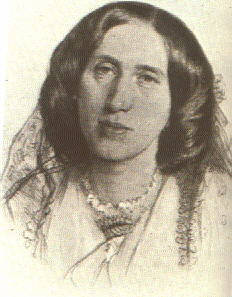| Course Description |
If the novel was the dominant literary genre of the nineteenth century, Charles Dickens and George Eliot were its undisputed masters. Even as they cast a sober and critical eye on contemporary cultural concerns, their novels ring with thrilling tales of theft and murder, domestic violence and sexual intrigue. Through these sensational scenes and sober social commentaries, Dickens and Eliot trace the contours of human psychology, giving life to characters both grotesque and realistically complex. Although Eliot and Dickens adopted very different prose styles and narrative voices, both of these authors paint vibrant pictures with bold strokes, and modern readers will find much in these texts to interest and entertain them. In this course, we will consider the position of the work of these two literary giants within its original nineteenth-century context while also appreciating its continuing popularity and cultural relevance. As we enjoy their tales of love lost and found, of daughters fallen and reclaimed, of crimes committed and discovered, we will have opportunities to discuss both the historically specific concerns of mid-Victorian Britain (industrialization, emigration, poverty, trade, education, and medicine) and more universal issues such as family, morality, individual independence, and civic responsibility.
Given the impressive length of many of these texts, course writing requirements will be relatively light to allow students more time for reading. Students can expect, on average, to read approximately 300-350 pages per week; short quizzes and in-class activities will be offered to encourage students to keep pace with this schedule. In addition to these less “formal” assignments, course requirements include active participation in class discussion. For the remainder of the grade, each student will be asked to choose–in consultation with the instructor–an individualized combination of formal papers and exams he or she will complete in fulfillment of the written requirements for the course. |
 |
Charles Dickens |
22 August
Tuesday |
Course Overview and Introduction to Dickens |
24 August
Thursday |
A Christmas Carol |
29 August
Tuesday |
Dombey and Son, parts 1-4 (chapters I-XIII), pages 1-204 |
1 September
Thursday |
Dombey and Son, parts 5 and 6 (chapters XIV-XIX), pages 205-301 |
6 September
Tuesday |
Dombey and Son, parts 7-11(chapters XX-XXXIV), pages 301-540 |
8 September
Thursday |
Dombey and Son, parts 11-13 (chapters XXXV-XLI), pages 540-637 |
13 September
Tuesday |
Dombey and Son, parts 14-18 (chapters XLII-LVII), pages 637-876 |
15 September
Thursday |
Dombey and Son, parts 19 and 20 (chapters LVIII-LXII), pages 877-957 |
20 September
Tuesday |
Bleak House, parts I-IV (chapters 1-13), pages 13-214 |
22 September
Thursday |
Bleak House, parts V and VI (chapters 14-19), pages 214-315 |
27 September
Tuesday |
Bleak House, parts VII-XI (chapters 20-35), pages 315-570 |
29 September
Thursday |
Bleak House, parts XII and XIII(chapters 36-42), pages 570-668 |
4 October
Tuesday |
Bleak House, parts XIV-XVIII (chapters 43-59), pages 570-915 |
6 October
Thursday |
Bleak House, parts XIX and XX (chapters 60-67), pages 916-989 |
11 October
Tuesday |
Reading catch-up. Discuss take-home midterm and optional papers |
13 October
Thursday |
Reading catch-up. Discuss take-home midterm and optional papers
Midterm exams or first papers due by 5:00 Friday. Although you may leave your exams/papers in my box in the English Department, I take no responsibility for papers that are lost or misdirected. Any requests for extensions to this deadline must be made with me in advance. |
 |
George Eliot |
18 October
Tuesday |
The Mill on the Floss, books First and Second (pages 9-201) |
20 October
Thursday |
The Mill on the Floss, book Third (pages 203-281) |
25 October
Tuesday |
The Mill on the Floss, books Four-Six (pages 282-501) |
27 October
Thursday |
The Mill on the Floss, book Seven (pages 502-544) |
1 November
Tuesday |
Silas Marner, Part I (pages 3-131) |
3 November
Thursday |
Silas Marner, Part I (pages 3-131) |
8 November
Tuesday |
Middlemarch, Book One (pages 5-120) |
10 November
Thursday |
Middlemarch, Book Two (pages 121-225) |
15 November
Tuesday |
Middlemarch, Book Three (pages 229-319) |
17 November
Thursday |
Middlemarch, Book Four (pages 321-427) |
22 November
Tuesday |
Thanksgiving Break–No Class Meeting |
24 November
Thursday |
Thanksgiving Break–No Class Meeting |
25 November
Tuesday |
Middlemarch, Books Six and Seven (pages 533-730) |
1 December
Thursday |
Middlemarch, Book Eight (pages 733-838) |
6 December
Tuesday |
Reading catch-up. Discuss take-home final exam and optional papers |
8 December
Thursday |
Course Review. Reading catch-up. Discuss take-home midterm and optional papers |
13 December
Thursday |
Take-home final due by 2:00 pm. All optional papers must also be turned in by 2:00. I will be in our classroom between 12:00 and 2:00 (the regularly scheduled exam time) to take papers and/or exams. Although you may leave your exams/papers in my box in the English Department, I take no responsibility for papers that are lost or misdirected. Any requests for extensions to this final deadline must be made with me in advance. |
| Discussion Questions Assignment |
| Over the course of the semester, each student will be asked to submit to the class two sets of discussion questions. Each set of questions will address the reading for that day and should be designed to help spur our discussion by highlighting important issues in the text or by introducing the student’s own ideas about the reading. There should be 3-5 well-constructed, interesting, provocative, eloquent, discussion-oriented questions in each set, and students are reminded that this is an assignment for which they will receive a grade. In other words, if you want an “A” for this assignment, you’ll have to think and craft and refine your questions very carefully. Because these are questions meant to elicit discussions, students will be asked to email their questions to the rest of the class the day (or night) before they are due in class. This assignment will count towards 10% of your course grade. |
| Paper and Exam Options |
As outlined above, students may select from a series of combinations of papers and exams to satisfy the course writing requirements. Reading quizzes, discussion questions, and class participation together account for 35% of your final semester grade; papers and exams will make up the remaining 65%. Students are asked to select from the following options:
Option One: Four Short Papers
Under this option, students will write a series of four short papers (each 3-5 pages in length, for a combined total of no less than 14 pages) over the course of the semester. Students may choose their own topics and are encouraged to discuss their choices with the instructor. Issues introduced in lecture or during class discussion may form the basis of a short paper, but students are not to simply rehash an idea exhaustively covered during class. In other words, you may find inspiration in what we talk about during class time, but your papers should add new, original elements that are distinctly your own. Each short paper should focus on one, and only one, of the texts we’ve read this semester. Of the four papers, no more than two may focus on the same text. In other words, your four papers must engage with at least three different texts. Three of the papers will each be worth 15% of your final course grade; the fourth will be worth 20% (your highest-scoring paper will be weighted more heavily). You may turn these papers in at any time during the semester, though I do require that AT LEAST ONE paper be turned in by 5:00 FRIDAY, 14 OCTOBER. All four papers must be completed by 5:00 TUESDAY, 13 DECEMBER.
Option Two: Two Medium-Length Papers
Under this option, students will write two papers of medium length (6-8 pages, for a combined total of no less than 14 pages) over the course of the semester. Students may choose their own topics and are encouraged to discuss their choices with the instructor. Issues introduced in lecture or during class discussion may form the basis of a paper, but students are not to simply rehash an idea exhaustively covered during class. In other words, you may find inspiration in what we talk about during class time, but your papers should add new, original elements that are distinctly your own. Each paper should address at least one of the texts we’ve read this semester, and a given paper may address more than one text. You may, in other words, write about a single text or about an issue relevant to several texts. One paper will be worth 30% of your final grade for the course; the other will be worth 35% (your higher-scoring paper will be weighted more heavily). You may turn these papers in at any time during the semester, though I do require that AT LEAST ONE paper be turned in by 5:00 FRIDAY, 14 OCTOBER. Both papers must be completed by 5:00 TUESDAY, 13 DECEMBER.
Option Three: One Long Paper
Under this option, students will write a single paper 14-16 pages in length. Students may choose their own topics and are STRONGLY encouraged to discuss their choices with the instructor. Issues introduced in lecture or during class discussion may form the basis of a paper, but students are not to simply rehash an idea exhaustively covered during class. In other words, you may find inspiration in what we talk about during class time, but your paper should add new, original elements that are distinctly your own. Because this one paper will be worth a full 65% of your grade for the course, students should think carefully before selecting this option. The paper must be completed by 5:00 TUESDAY, 13 DECEMBER. Students selecting this option MUST meet with me prior to FRIDAY, 14 OCTOBER in order to discuss topics and strategies and to secure instructor approval for the project.
Option Four: Two Exams
Under this option, students will complete two exams: a midterm and a final. One exam will be worth 30 % of your course grade; the other will be worth 35% (your higher-scoring exam will be weighted more heavily). The exams will be take-home, essay format. Unlike the paper assignments, which allow students to select their own topics, the exams will prompt students to respond to specific issues chosen by the instructor. Responses to the exam questions must be typed. The midterm exam will be due by 5:00 FRIDAY, 14 OCTOBER. The final exam must be completed by 5:00 TUESDAY, 13 DECEMBER.
Option Five: Combination of Paper(s) and Exam(s)
Under this option, students will write either two short (3-5 page) papers OR one medium-length (6-8 page) paper AND take one exam. By 5:00, FRIDAY, 14 OCTOBER, students selecting this option must have turned in at least one of these assignments. The remaining assignments are to be completed no later than 5:00 TUESDAY, 13 DECEMBER. The better of the two assignments will count for 35% of your course grade; the other will account for the remaining 30%. |